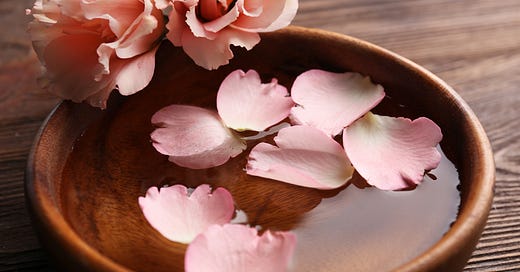Make your own rose water for food and health
Rose water, originating from Iran thousands of years ago, is produced by steam-distilling rose petals. It has traditional uses in both culinary and beauty applications.
Today’s post was inspired by one of my favorite herbalists, Alexis Nikole Nelson (aka the ‘Black Forager' on social media)! She put out a fun video this week on how to make your own rose water at home. Luckily for me, I have three rose bushes in bloom and as they are grown organically without any agrochemicals, I was eager to try this out for myself!
Alexis made the process super easy to understand and replicate. Take a look:
How to make a rose hydrosol at home

The scientific term for any herb extracted through steam distillation is hydrosol. More specifically, a hydrosol is a byproduct of the essential oil extraction process, typically collected through steam distillation. It's essentially floral water, carrying a subtle aroma and properties of the plant, and can be used in skincare, aromatherapy, and cooking.
In addition to watching Alexis’ video, you may find this step-by-step process for making a rose petal hydrosol at home helpful:
Gather fresh rose petals from 5-7 fragrant roses (around six handfuls of petals). The stronger the scent of your roses, the stronger smelling your rose water will be!
I strongly advise against using store-bought roses as they are often treated with fungicides, and you don’t want to consume or apply those chemicals to your body. You can also use dried roses, but again, check that they haven’t been treated with chemicals. Avoid any potpourri mixes as well.
Gather your kitchen items:
Cooking pot with a glass lid
Two small, heat-safe bowls that can fit inside the cooking pot
Water to boil. You can use distilled water from the store (or tap water is also acceptable).
Ice cubes
Place one bowl upside down and the other bowl on top (right side up) inside the pot. Pour water around the bowls up to the level where one bowl sits on top of the other.
Add your roses to the water surrounding the bowls. Put the lid onto the pot upside down. Place ice cubes on top of the inverted lid.
Bring water to a boil. Replace ice cubes on the lid as they melt.
You’ll see steam form and then accumulate as water droplets condense on the lid. These will then fall into your bowl.
Once the bowl is relatively full, the process is done! You have a rose hydrosol (rose petal water)!
How it it used?
Rose water is a versatile ingredient with several uses. In skincare, it's valued for its soothing, hydrating, and anti-inflammatory properties, often found in toners, creams, and masks. It's also used in aromatherapy for its calming and mood-enhancing qualities.
In the culinary world, it's used as a flavoring in various dishes and drinks, especially in Middle Eastern and South Asian cuisines, lending a floral note to desserts like baklava or beverages like lassi (a delicious Indian yogurt drink). One of my favorite uses of rose water is as a flavoring. I splash onto a bowl of pomegranate fruit. It also makes a lovely summer spritz! Try this recipe combining pomegranate juice, sparkling mineral water, fresh mint, and ice! Delicious and refreshing!
When it comes to skincare, rose water can be rubbed directly on the skin or spritzed on the skin with a spray bottle for a soothing and anti-inflammatory effect. One lab study found that rose hydrosol potentially inhibits skin inflammation caused by certain skin microbes. Another study demonstrated that rose hydrosol exhibits a low risk for toxicity and could be considered safe for various uses by humans. Note that, as with any concentrated herbal preparation, ensuring that the herb is not contaminated with agrochemicals (pesticides, herbicides, antimicrobials, or other agents) is very important for preventing toxic exposures to such compounds in concentrated form.
The Takeaway
Summertime is the perfect season to enjoy the beauty of your rose bushes, harvest the petals, and enjoy their lovely scent in hydrosol form! Rose water is a safe herbal ingredient suitable for topical or internal uses. You don’t need expensive equipment to prepare it; standard kitchen implements work great! Try it out! I’d love to hear from you! What are your favorite rose water recipes?
Yours in health, Dr. Quave
Cassandra L. Quave, Ph.D. is a scientist, author, speaker, podcast host, wife, mother, explorer, and professor at Emory University School of Medicine. She teaches college courses and leads a group of research scientists studying medicinal plants to find new life-saving drugs from nature. She hosts the Foodie Pharmacology podcast and writes the Nature’s Pharmacy newsletter to share the science behind natural medicines. To support her effort, consider a paid or founding subscription, with founding members receiving an autographed 1st edition hardcover copy of her book, The Plant Hunter.







